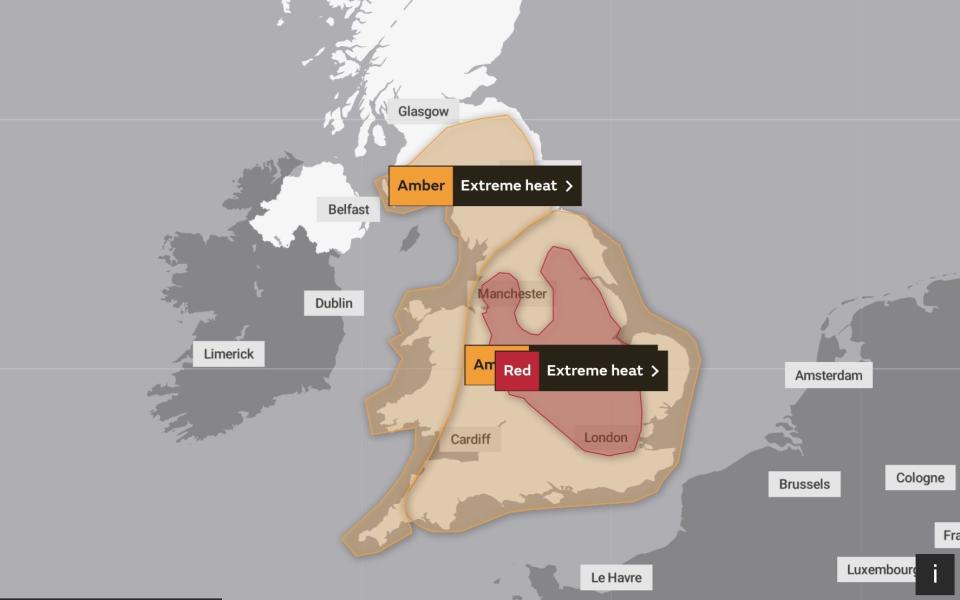Met Office warns it won’t be safe to go outside and ‘play in the sun’ next week

The public has been warned that it will not be safe next week to go outside and “play in the sun”, as the Met Office issued an unprecedented warning about the imminent heatwave.
A “red warning” has been declared across England as the forecaster said national temperature records would likely be broken on Monday or Tuesday next week.
While such warnings have previously been issued for storms, one has never been declared over heat.
There is a 50 per cent chance that temperatures of more than 40C will be seen, forecasters said, the first time this has been predicted for the UK.
The heat is expected to put more pressure on already overstretched emergency services, disrupt daily routines and lead to travel delays as experts warned of “unprecedented” weather conditions.
The UK’s first ever national heat health emergency is set to bring “potential effects on transport systems, food, water, energy supplies and businesses”, the UK Health Security Agency said.
Temperatures of 41C were forecast at Heathrow Airport, more than two degrees higher than the current record of 38.7C set in 2019 in Cambridge.
Two days of very hot weather with a “tropical night” in between, where temperatures do not fall below 20C, are expected to lead to widespread health problems, including heat exhaustion and heatstroke, particularly among the elderly. Hospitals cancelled routine operations and appointments in preparation.

In an apocalyptic video posted online, Professor Penny Endersby, chief executive at the Met Office, warned that the UK was not prepared.
She said: “We’ve seen when climate change has driven such unprecedented severe weather events all around the world it can be difficult for people to make the best decisions in these situations because nothing in their life experience has led them to know what to expect.
“Here in the UK we're used to treating a hot spell as a chance to go and play in the sun. This is not that sort of weather. Our lifestyles and our infrastructure are not adapted to what is coming.”
Our @metoffice forecasters have issued the first ever Red Extreme heat warning for unprecedented heat across parts of the UK on Monday and Tuesday.
Please take this warning seriously and take steps to keep you and those around you safe. #heatwave pic.twitter.com/vjMUsvYtbP— @MetOfficeCE (@metofficece) July 15, 2022
‘National emergency’ health warning
The UK Health Security Agency has increased its heat health warning from level three to level four - a “national emergency”.
Level four is reached “when a heatwave is so severe and/or prolonged that its effects extend outside the health and social care system ... At this level, illness and death may occur among the fit and healthy, and not just in high-risk groups”, it said.
Downing Street has not issued work from home guidance during the heatwave.
A No 10 spokesman said: “Different sectors and different professions may have different staffing requirements, it wouldn’t be for me to set out a broad policy for everybody, that would be a matter for individuals and their employers.”
Britain will suffer “delays on roads and road closures, along with delays and cancellations to rail and air travel, with significant welfare issues for those who experience even moderate delays”.
England’s chief medical officer, Professor Sir Chris Whitty, asked people on Twitter to look out for each other.
The Met Office has issued an extreme heat warning for next week. Please remember the signs of heat exhaustion and heatstroke especially for older and medically vulnerable people. Early intervention to cool people down and rehydrate them can be lifesaving.https://t.co/E8U0ELTxqy pic.twitter.com/0xpSauGl2O
— Professor Chris Whitty (@CMO_England) July 15, 2022
Motorists have been told to try and make their journeys outside of the hottest times of the day, particularly if they have older cars.
Gritters out with sand to stop ‘roads melting’
Sean Sidley, of the AA, said: “There are reports of road gritters being out (with sand) this weekend to reduce the chances of our roads melting.
“If it does get sticky on the roads, there's nothing worse than being stuck in a jam with the mercury rising, so make sure you carry plenty of water - at least a litre per person - and sufficient fuel, or if you’re driving an electric vehicle (EV) make sure you have plenty of charge so you can use the air conditioning when needed.”
Rod Dennis, RAC Breakdown spokesperson, said: “We anticipate there could be around 15 to 20 per cent more breakdowns on Monday and Tuesday, which equates to more than 1,000 extra people needing help each day.”
A No 10 spokesman said railway speed restrictions may be needed on “some parts of the network next week to manage the hot weather and to avoid any potential damage”.
Jake Kelly, of Network Rail, warned that journeys will take “significantly longer and delays are likely as speed restrictions are introduced to keep passengers and railway staff safe”, urging people to travel only if absolutely necessary on Monday and Tuesday.
The organisation said response teams will be deployed to mitigate the impact of the extreme heat where possible, but passengers are likely to experience disruption if current forecasts are realised.

Steel rails absorb heat easily and tend to be around 20 degrees above the surrounding air temperature. When steel becomes very hot it expands and rails can bend, flex and, in serious cases, buckle.
The overhead electric lines which power trains in some parts of the country are also susceptible to faults in extreme temperatures when the steel wires overheat, which can cause them to hang too low and increase the risk of getting caught on passing trains and knocking out the electricity supply.
Tim Doran, from the RNLI Water Safety Team, said the service is anticipating a “busy weekend” at the coast for its lifeboat crews and lifeguards.
“If you are planning on going to the beach, we would encourage you to visit a lifeguarded beach and swim between the red and yellow flags,” he said.
The amber warning for extreme heat for much of England and Wales had been put in place until the end of Tuesday, with the hot spell expected to peak at the start of next week, but has now been upgraded.
Britain was last placed under a red weather warning during storm Eunice in February this year, during which high winds caused £360 million worth of damage, including ripping off part of the roof of the O2 Arena.
By Olivia Rudgard and Lizzie Roberts
The start of the summer holidays beckons - but any plans for Monday and Tuesday are set to be complicated by a record-breaking heatwave.
The great school holiday getaway will be difficult by car or by train as Britain’s infrastructure crumbles under “unprecedented” hot weather.
High temperatures on Monday and Tuesday are set to cause problems for the UK’s travel, building and power systems, amid concern that Britain is simply not designed for 40C conditions.
Greyhound and horse-racing events were cancelled and people were asked to avoid unnecessary travel and check on their neighbours amid concern about widespread heatstroke, particularly among elderly people.
As well as the daytime record of 38.7C, the night-time record of 23.9C is also likely to be broken in London, forecasters said.
And more may be yet to come. The Met Office said it could not rule out more heatwaves later in the summer, as “heat dome” conditions building up over the Mediterranean are brought further north by the wind.
Warning tyres will explode in the heat
Extreme heat can lead to tyres becoming over-inflated, causing blowouts which lead to car crashes, paramedics warned.
North West Ambulance Service warned that the “rubber generates more friction and heat on the hot roads”.
Tyres wear away in the centre when they are over-inflated, and less contact with the road means less traction and higher stopping distances, the AA says.
Drivers in older cars should be particularly cautious and everyone should check their coolant and oil levels before heading out, the AA said.
Two train companies, Thameslink and Great Northern, said they would be running a “significantly reduced service” on Monday and Tuesday, and the Gatwick Express was cancelled altogether.
High temperatures are also expected to affect Tube and bus journeys in London. Transport for London relaxed uniform rules so drivers can wear shorts and short-sleeve shirts, and drivers are allowed to stop and take a break if their cab becomes uncomfortably hot.
Hot weather often leads to even hotter temperatures on London’s older Tube lines, where temperatures over 40C have previously been recorded.
If air conditioning fails this could also affect the decision-making of staff in control centres, a TfL report warned last year.

Roofs could start leaking
Plastic gutterings and lead flashings can expand in the heat, leading to leaks the next time it rains.
Guttering might be installed with enough leeway to expand by 10mm, but very hot weather can make it expand more than that, the Chartered Institute of Plumbing and Heating Engineering warned.
Lead flashings are often used to seal gaps in roofs and around porches.
Jerry Whiteley, CIPHE technical manager, said: “Materials outside - gutters, lead flashings - are quite severely affected by the heat, with regards to the expansion rate of the material.
“The greater the heat, the more it expands.”
Condensation on hot roofs can also lead to water damage over time, while direct sun can lead to blistering and cracking on asphalt.

Power cuts likely
The Met Office warns of “localised loss of power and other essential services” in the area covered by the red warning.
Hot weather can lead to overheating transformers and decreased efficiency in power lines, which can sag in the heat.
Britain’s local power network companies have ramped up their internal alert levels, checking spare parts in storerooms and making sure they have enough staff to fix faults and take calls from customers.
Planned maintenance may also be cancelled to avoid staff having to work in the middle of the day.
Tom Edwards, a modeller at consultancy Cornwall Insight, said: “Increased temperatures can reduce the efficiency of thermal and solar generators, as well as reduce the capacity of transformers and overhead lines.
“Distribution and transmission equipment will also require increased cooling as higher temperatures can increase the degradation of key components which could lead to failure.”
Companies said they were operating “as normal” and were confident that networks could cope.
Ross Easton, director of external affairs at the Energy Networks Association, said: “Network infrastructure is designed for extreme temperatures but network companies in the areas affected by the red warning from the Met Office have escalated their internal preparedness as a precaution.”
Give nurses extra breaks, says Royal College
The Royal College of Nursing has called for nurses to be given extra breaks and access to designated drinking stations amid concerns for safety in the heat.
Helen Donovan, RCN professional lead for public health, said: “If nurses do not have the time and resources to take care of themselves, the care they can give patients will be impacted.”
Paramedics should be allowed to make “sensible changes” to their uniforms as temperatures could reach 40C next week, Unison has said.
Alan Lofthouse, UNISON ambulance lead, said he had received reports of staff collapsing through heat exhaustion.
“In hot countries like Australia, ambulance crews can change into shorts when the temperatures soar,” he said.
“Without adequate cooling systems, crews and patients queueing in ambulances outside hospitals in the heatwave will soon become unbearably hot. Any vehicles without air-con should be removed from service in the stifling heat.”
Ambulances queuing outside the Grange University Hospital, Cwmbran, Wales, were given portable air conditioning units this week after patients were forced to wait hours to be admitted.
NHS England has told hospitals to take “immediate steps” to reduce handover delays for ambulance patients to less than 30 minutes, including creating extra space to move patients out of A&E.
At least one hospital has cancelled routine surgery next week amid concerns for patients travelling for their appointments in the heatwave.
Joe Harrison, the chief executive of Milton Keynes University Hospital, said routine outpatient appointments and surgery would not go ahead on Monday and Tuesday.
Mr Harrison said on Twitter: “It has been extremely busy @MKHospital over the past week, with more patients than usual needing emergency care and significant pressure on our staff. As we go into the weekend, temperatures are forecast to rise up to 39C on Monday & Tuesday.”
“We have taken the decision to stand down routine outpatient appointments and surgery on Monday and Tuesday because many of patients travelling to these appointments are frail and at increased risk, and due to the unpredictable nature of very high temperatures on demand for emergency care and on care environment.
“We will do all we can to keep wards and departments as cool as possible, but we know this will be a challenge given the very high outside temperature.”

 Yahoo News
Yahoo News 
